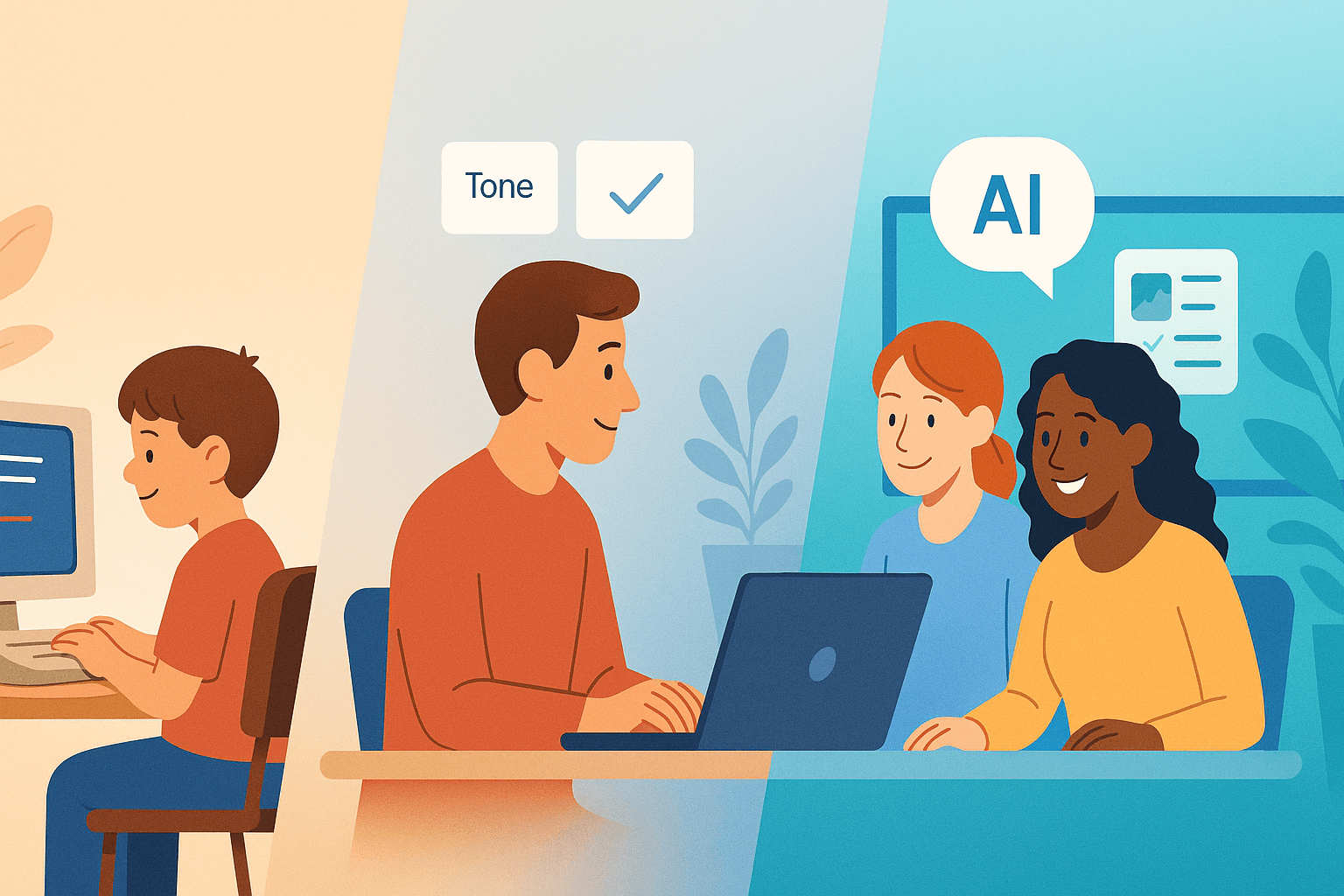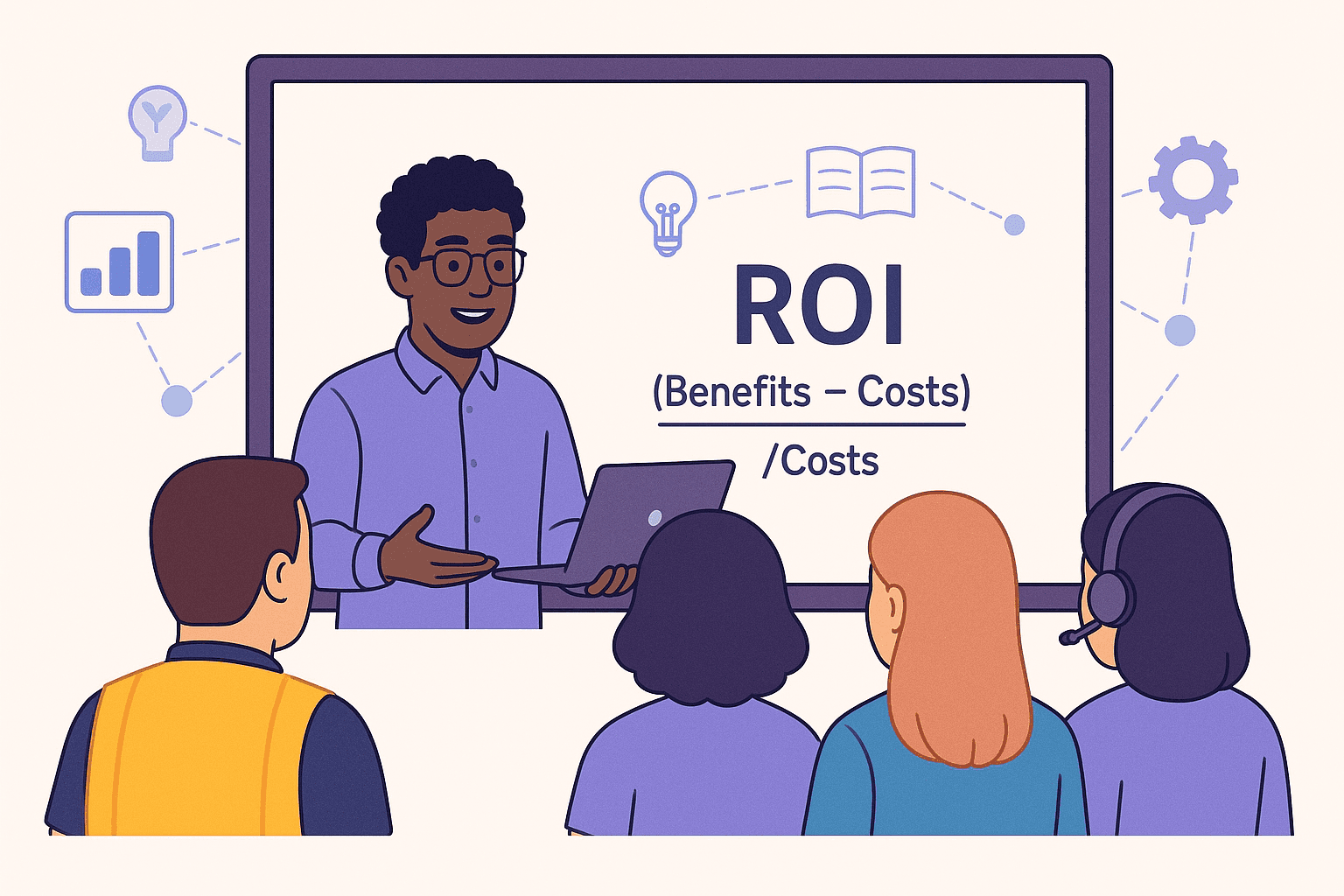2 min
Aug 26, 2024
How are others solving current problems in the eLearning landscape and what tools are they using?
Carmen Naupaka

In recent decades, we’ve seen an explosion of eLearning applications. Though the term “e-learning” was only coined in 1999, the technology that bears its name has become virtually ubiquitous in modern education and corporate training: it’s estimated that the global e-learning market, already valued at over $200 billion, will reach almost $400 billion by 2026.
As e-learning continues to grow and change, though, so do the challenges that educators and learners face. Understanding these challenges is crucial for developing effective e-learning strategies and solutions.
Ahead, expect to a briefing on the main challenges eLearning faces today—and a look at how some leading platforms are facing those challenges.
Engagement and Motivation
One huge challenge in e-learning right now concerns learner engagement and motivation. Online learning lacks the face-to-face interactions and the structured environment that keep learners focused in traditional environments. The same flexibility that makes e-learning attractive can, predictably, also lead to procrastination and a lack of discipline. One study on e-learning programs found that dropout rates for online courses can be as high as 40-80%. These rates are no doubt influenced by the isolation that learners often feel when studying online.
Personalization of Learning Paths
Another major challenge is the personalization of learning paths. Every learner has unique needs, learning styles, and paces, but many e-learning platforms still adopt a one-size-fits-all approach. This can lead to poor learning outcomes as students struggle to keep up or become bored with content that is either too difficult or too easy. Personalizing learning experiences is essential to cater to individual differences, but it requires sophisticated technology and considerable resources to implement effectively.
Almost invariably, personalization is a problem of scale. One Australian educator who participated in a recent qualitative study put it this way: “I suppose the biggest challenge would be, how would we implement the curriculum as in the timetable? How would we implement that in terms of, do you do it within the class and so how much support do you get in the class.” Whether in a traditional classroom setting or in an online professional seminar, L&D professionals who can answer these questions are the ones who reap the rewards of personalization.
Content Quality and Relevance
Learners need high-quality, up-to-date materials to stay engaged and achieve their learning goals. But producing and maintaining such content can be challenging. Outdated or irrelevant material not only fails to engage learners but can also lead to misinformation and a lack of trust in the e-learning platform. Ensuring content quality and relevance is an ongoing task that demands continuous updates and industry expertise.
Technical Issues and Accessibility
Problems with platform compatibility, user interface design, and technical support also plague LMSs and other eLearning tools. These issues can disrupt the learning process and frustrate users.
Additionally, accessibility remains a significant challenge. E-learning platforms must cater to learners with disabilities and those in regions with low bandwidth. Ensuring that content is accessible to all users, regardless of their circumstances, is crucial for inclusive education.
Measuring Learning Outcomes
In traditional classroom settings, teachers can directly observe student performance and provide immediate feedback. In contrast, e-learning relies on data and analytics to track progress and outcomes. However, many platforms struggle to provide meaningful insights into learner performance. Without accurate measurement tools, it is difficult to identify areas for improvement and ensure that learning objectives are being met.
Addressing all these challenges requires innovative solutions and a deep understanding of the needs and behaviors of modern learners. Fortunately, leading e-learning platforms have developed various strategies to overcome these obstacles, paving the way for more effective and engaging online learning experiences. For the rest of this article, we’ll explore how Coursera, Udemy, LinkedIn Learning, and Khan Academy tackle the common e-learning challenges.
Coursera: Engaging Learners Through Interaction and Certification
Coursera has set a high standard for engagement and motivation in e-learning. Recognizing the importance of interactive learning, Coursera offers a variety of course formats that include video lectures, interactive quizzes, and peer-graded assignments. This mix of activities keeps learners actively involved and reinforces their understanding of the material.
These professional certifications and specializations add a layer of motivation. Learners are not just gaining knowledge; they’re earning credentials that can enhance their careers. This tangible outcome incentivizes learners to complete courses and stay engaged.
Udemy: Ensuring Content Quality and Accessibility
Udemy addresses the challenge of content quality and relevance through its user-generated content model. Instructors from around the world can create and upload courses, but Udemy employs a rigorous rating and review system to maintain high standards. Learners can choose from a vast array of courses, guided by reviews and ratings that reflect the course’s quality and relevance.
When it comes to accessibility, Udemy excels with its multi-language support and mobile-friendly interface. Learners can access courses on various devices, ensuring that education is available anytime, anywhere. This flexibility is particularly beneficial for learners in different regions and those with busy schedules—like JJ, a Peruvian conservationist and organizational leader who used Udemy to bolster his leadership skills.
LinkedIn Learning: Professional Development as Learning Outcome
LinkedIn Learning, formerly known as Lynda.com, leverages its unique position within the professional network of LinkedIn to align e-learning with career development.
This alignment with current industry standards helps learners acquire relevant skills that can directly impact their professional lives—and it offers a powerful means to measure learning outcomes. LinkedIn Learning integrates course completions and skill acquisitions with users’ LinkedIn profiles. This integration not only helps learners track their progress but also showcases their new skills to potential employers, adding a motivational factor to the learning process.
Khan Academy: Providing Free, High-Quality Education
Khan Academy stands out by addressing both technical accessibility and personalized learning paths. The platform offers free access to a wide range of high-quality educational content, making learning accessible to anyone with an internet connection. This commitment to free education breaks down financial barriers and ensures that learners from all backgrounds can benefit.
Khan Academy also excels in personalized learning. The platform’s mastery learning approach allows learners to progress at their own pace, ensuring they fully understand each concept before moving on. Personalized practice exercises and instant feedback help learners identify their strengths and areas for improvement, creating a tailored learning experience.
Mindsmith: Leveraging Generative AI for E-Learning Excellence
At Mindsmith, we believe that the future of e-learning lies in harnessing the power of generative AI. We address the challenges of engagement, content quality, accessibility, and outcome measurement by using a unique AI-first approach.
Engagement and Motivation: Mindsmith uses AI-driven content creation tools to help L&D professionals more quickly create tailored, engaging, and motivating learning experiences.
High-Quality, Relevant Content Generation: Generative AI tools enable Mindsmith to create up-to-date and contextually relevant content. AI-assisted content curation ensures that material remains engaging and pertinent, keeping learners interested and informed.
Additionally, our editing tools enable real-time collaboration between multiple team members, which means each lesson combines the best of each teammate’s touch.
Enhancing Accessibility and Technical Usability: Mindsmith’s AI-powered language translation and text-to-speech capabilities enhance accessibility for all learners. Our seamless integration with various devices and platforms guarantees a smooth user experience, no matter the learner’s technical environment.
Conclusion
E-learning offers unparalleled flexibility and access to educational resources. However, this transformation comes with its own set of challenges, as we’ve seen.
Leading e-learning platforms have risen to these challenges with innovative solutions, whether that involves professional certifications, user-generated content, integration with professional development, or truly open source educational offerings.
Mindsmith takes e-learning innovation to the next level by leveraging generative AI to address these challenges—through collaborative editing tools, context-sensitive generative AI, and expansive accessibility and sharing features.
In a world where continuous learning is essential for personal and professional growth, Mindsmith stands at the forefront of e-learning innovation. We are committed to creating a dynamic, personalized, and engaging educational experience for all learners—and in the long term we plan on delivering truly personalized, responsive learning paths powered by AI. Whether you’re an instructional designer seeking to create impactful training material, an HR professional aiming to upskill your workforce, or an AI power user looking for the latest in educational technology, Mindsmith offers the tools and solutions to transform e-learning into a powerful and effective learning journey.



